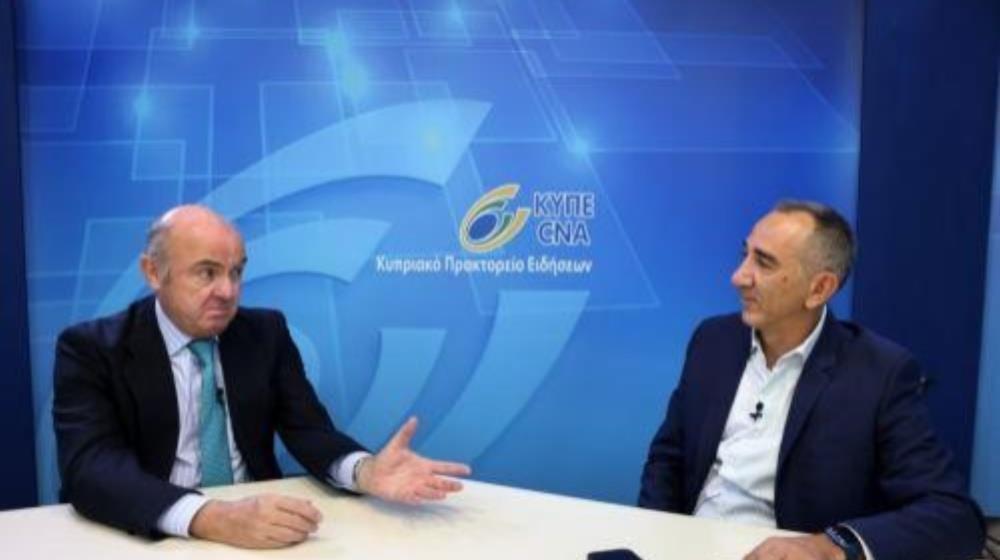A discussion on interest rate cuts is premature, Louis de Guindos, Vice President of the European Central Bank, told CNA noting that the ECB will continue its data-depended monetary stance because although inflation has subsided “we have not reached the target” of 2%.
De Guindos pointed out that the normality is the positive interest rates, as opposed to the negative rates during the deflationary pressures observed previously in the Euro area, stressing that rate hikes concern both the asset and the liabilities side of the commercial banks’ balance sheets.
With regard to the ECB’s future moves, de Guindos did not clarify whether the current level of interest rates constitutes the peak of the monetary tightening cycle, stressing the uncertainty over the outlook. He noted that the ECB is closely monitoring wage increases in the Euro area, as this would signal additional inflationary pressures.
The Spanish technocrat also praised Constantinos Herodotou, the Governor of the Central Bank of Cyprus, presence in the ECB Governing Council and he highlighted the progress made both by the Cypriot economy and the banking sector since the 2013 financial crisis, during which he participated in the Eurogroup meetings over Cyprus bailout package, as then Spain’s Finance Minister.
“The progress made by the Cypriot economy and the banking industry here in Cyprus has been quite impressive. I remember, you know, the times, because I was finance minister of Spain in 2013 and I thing that the situation now is totally different,” he said.
De Guindos described the latest upgrade of the two largest banks to investment-grade as “very good news”, recalling that this rating action followed the upgrade of the Republic’s long-term credit rating.
“And I think that's a clear reflection about, you know, the improvement of the economy and the improvement of the banking industry”, the ECB Vice President said.
Responding to a question whether the latest ECB’s remarks following the September Governing Council meeting show that the rate hike cycle has reached its peak, de Guindos said that the ECB’s decisions are data dependent.
“We will see, there is a huge level of uncertainty. Let's see what happens for instance, with the price of oil that has been on the rise over the last weeks. This is an element that's an exogenous variable for us. But we believe that the present level is the correct one in order to try to meet our primary target that is price stability,” he said.
Apart from the oil prices, the ECB Vice President said among the variables monitored are the euro exchange levels (although not in the ECB’s) mandate that could lead to price pressures and wage increased.
Noting that the European labour market showed a good performance, de Guidos added that we have started to see that wage growth is a little bit above 5%.
“Well, that could be you the consequence of workers trying to catch up with respect to the loss of disposable, real disposable income of the last two years. But this is something that we'll have to monitor closely because it could give rise to additional inflationary pressures,” he said.
Responding to a question whether, high interest rates will constitute the normality, de Guindos pointed out that what was not normal was the previous interest rate levels. “Because we had some deflationary pressures in the European economy and so to have negative interest rates was not normal,” he said adding the normality is to have “positive figures.”
We are not there yet
Replying to a question, whether it is premature to consider rate cuts as inflation is on the way down, de Guindos said such discussion is “premature.”
“We have seen an important reduction, but our definition of price stability is 2% and we are not there,” he said.
Furthermore, replying to a question whether the ECB rate hikes are sufficiently passed on deposit rates offered by banks, de Guindos said when we increase interest rates, we increase interest rates for everything, for the asset side and the liability side of the banks.
“So, for loans and for deposits, even if normally, you know always the banks they are much more rapid you know, increasing interest rates on loans,” he remarked, pointing out that increasing deposit rates is also very important because the transmission of monetary policy is not only about the tightening of financing conditions.
“So, our position is quite clear. When we hike rates, we hike rates in all the expressions of interest rates for loans for deposits, and this is something that you know, we are going to look at very carefully,” he went on to say.
Responding to criticism that Central Banks increase interest rates with no regard to business and household rising loan payment burden, de Guindos the alternative would be “much worse.”
“If we do nothing you know, the situation will be much worse,” he said, pointing out that a de-anchoring of inflation expectations would take hold which would have a detrimental impact to the evolution of the economy and at the end of the day, we would have to tighten even more, much more than that.
“So, the consequence of doing nothing will be a recession and an additional tightening of financing conditions in comparison with the situation that we have now”.
Stating that he knows “perfectly that when we increase interest rates, this is not popular,” de Guindos said this is the only way to deal with, you know, the biggest evil that we have now in the economy, that is inflation.”
Moreover, de Guindos praised the participation of Constantinos Herodotou in the ECB Governing Council, noting that he brought a “valuable approach” due to his experience in financial markets.
“There are 26 of us, but whenever the governor of the Cypriot central bank speaks, we listen with a lot of care,” he said.









